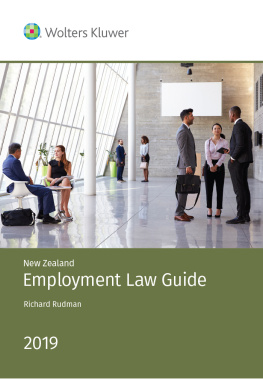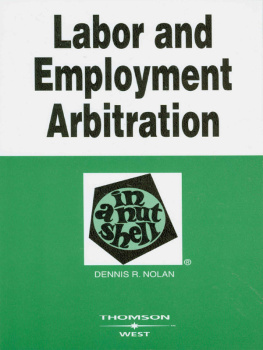Richard Stanley Rudman - NZ Employment Law Guide
Here you can read online Richard Stanley Rudman - NZ Employment Law Guide full text of the book (entire story) in english for free. Download pdf and epub, get meaning, cover and reviews about this ebook. year: 2019, publisher: CCH New Zealand Limited, genre: Politics. Description of the work, (preface) as well as reviews are available. Best literature library LitArk.com created for fans of good reading and offers a wide selection of genres:
Romance novel
Science fiction
Adventure
Detective
Science
History
Home and family
Prose
Art
Politics
Computer
Non-fiction
Religion
Business
Children
Humor
Choose a favorite category and find really read worthwhile books. Enjoy immersion in the world of imagination, feel the emotions of the characters or learn something new for yourself, make an fascinating discovery.
- Book:NZ Employment Law Guide
- Author:
- Publisher:CCH New Zealand Limited
- Genre:
- Year:2019
- Rating:3 / 5
- Favourites:Add to favourites
- Your mark:
- 60
- 1
- 2
- 3
- 4
- 5
NZ Employment Law Guide: summary, description and annotation
We offer to read an annotation, description, summary or preface (depends on what the author of the book "NZ Employment Law Guide" wrote himself). If you haven't found the necessary information about the book — write in the comments, we will try to find it.
NZ Employment Law Guide — read online for free the complete book (whole text) full work
Below is the text of the book, divided by pages. System saving the place of the last page read, allows you to conveniently read the book "NZ Employment Law Guide" online for free, without having to search again every time where you left off. Put a bookmark, and you can go to the page where you finished reading at any time.
Font size:
Interval:
Bookmark:

- HR Manager: A New Zealand Handbook (2017) and
- Getting the Right People: Effective Recruitment and Selection Today (2010).
- 1. Employment law is the legal framework for the employer-employee relationship. Every employment agreement is governed by the Employment Relations Act 2000 and every employer and every employee regardless of level or union membership comes within the Acts scope. Every aspect of the employment relationship is affected by employment law.
- 2. Employment law gives employees the right to organise and bargain collectively. Unions are given rights and privileges by the Employment Relations Act, and only unions registered under the Act may engage in collective bargaining on behalf of their members.
- 3. Employment law sets minimum entitlements. Minimum entitlements are set by legislation or regulation and apply to every employment relationship. Employees may accept better terms and conditions, but may not agree to lesser terms and conditions or contract out of their minimum legislative entitlements.
- 4. Employment law regulates workplace standards and conditions. Acts and other statutory instruments regulate working conditions and workplace standards. The Health and Safety at Work Act 2015 is the most prominent example.
Font size:
Interval:
Bookmark:
Similar books «NZ Employment Law Guide»
Look at similar books to NZ Employment Law Guide. We have selected literature similar in name and meaning in the hope of providing readers with more options to find new, interesting, not yet read works.
Discussion, reviews of the book NZ Employment Law Guide and just readers' own opinions. Leave your comments, write what you think about the work, its meaning or the main characters. Specify what exactly you liked and what you didn't like, and why you think so.









